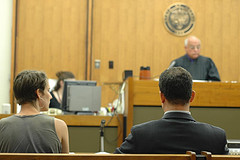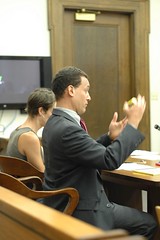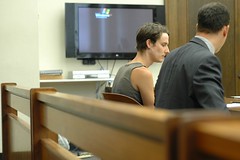Yesterday at the Multnomah County Courthouse the law came down against fixed gear bicycles.
On June 1, 2006 Portland bike messenger Ayla Holland was given a ticket for allegedly violating Oregon Revised Statute (ORS) 815.280(2)(a) which states,
A bicycle must be equipped with a brake that enables the operator to make the braked wheels skid on dry, level, clean pavement. strong enough to skid tire.
At issue was whether Holland’s fixed gear bicycle met this requirement. She and her lawyer Mark Ginsberg thought it did, but Officer Barnum of the Portland Police Bureau thought otherwise so they brought the matter in front of a traffic court Judge.
According to Officer Barnum, he stopped Holland at SW First and Jefferson and told her that she was in violation of the law and that she must put a front brake on her fixie to avoid a ticket. Holland disagreed. She and Ginsberg claim that Oregon statute does not clearly define what a brake is and that as long as a bicycle can perform a “skid on dry, level clean pavement” it does not need to have a separate, traditional braking device.
At the start of the trial it was clear that neither the Judge nor the Officer understood just what a fixed-gear bicycle was. To help them visualize, Ginsberg likened a fixie to a child’s Big Wheel. Once everyone was clear and the cop was finished with his opening testimony, Ginsberg began his cross-examination:
Ginsberg (to Officer Barnum):
“When you approached the rider did she stop?”
Officer Barnum:
“Yes.”
Ginsberg:
“How’d she stop the bike?”
Officer Barnum:
“I don’t know.”
Ginsberg:
“The gear itself stopped the bike.”
Officer Barnum:
“But the gear is not a brake.”
From the outset, the judge seemed to agree with the cop and it was up to Ginsberg to change his mind. The trial began to hinge on the definition of brake. Ginsberg continued to ask questions of the cop.
Ginsberg:
“What is a brake?”
Officer Barnum:
“A lever, a caliper or a coaster brake hub.”
Ginsberg:
“Can you show the court where in the vehicle code a brake is defined as such?”
Officer Barnum:
“No.”
Ginsberg:
“Did you at any time during the traffic stop ask my client if she could skid (thus meeting the performance requirement of the statute)?”
Officer Barnum:
“No.”
At this point the judge seemed increasingly exasperated with Ginsberg’s direction and pointed out that “brake” was a commonly accepted term. To end this line of questioning, Ginsberg offered to demonstrate to the court that Holland could easily bring her fixed-gear bike to a skid on dry, level pavement. The judge declined his offer.
Now it was time for Officer Barnum to ask questions. He asked Holland,
“What would you do if your chain broke?”
Holland:
“I would use my feet.”
Officer Barnum:
“What if your leg muscles had a spasm?”
Holland:
“I’m not sure…these are emergency situations.”
Ginsberg interjected with a question for Holland:
“Did any of these situations happen on the day you were stopped?”
Holland:
“No.”
Now it was time for Officer Barnum to submit his closing testimony. He continued to argue that nowhere in the statute does it say gears can be utilized as brakes (it doesn’t say they can’t either). He also said that “motorists and the public deserve to have these bikes be properly equipped,” and that a “skid is not as good or safe as a stop.” “The requirement,” he said, “has not been met.”
Now it was Ginsberg’s turn. He said,
“The state is overreaching in seeking to define a brake as a lever and a caliper. The question remains; is the fixed gear the brake? The statutes are clear that the answer is yes.”
To solidify his point, he took out a huge Webster’s dictionary and opened it to the word “brake.” The definition stated that a brake is a “device to arrest the motion of a vehicle.” It did not stipulate anything about a distinct lever or caliper. In his last few comments he proclaimed that the current statute is not well-written and that it is “frightening to require only a front brake.”
With both sides at rest, it was time for the Judge’s final opinion. His contention was that the main source of braking power on a fixed gear are the muscles of the rider, not the gear itself. To this end, he questioned how messengers—whom he’s seen riding “much too fast”—could stop safely.
In the Judge’s opinion, gearing itself and/or leg muscles are not a sufficient source of braking power. He said,
“The brake must be a device separate from the musclulature of the rider. Take me for instance. I don’t have leg muscles as strong as a messenger…how would I stop safely?”
He then turned directly to Ginsberg and said,
“If your client had a stick she could rub against her tire, you’d have a case. I don’t believe the defense has convinced me to broaden the definition of a brake. I find the defendant guilty.”
So now Holland has 30 days to either attach a hand brake to her bike and pay a $73 fine, or appeal the decision. In talking with her outside the courtroom it seemed like she did not think the Judge’s opinion was fair and I wouldn’t be surprised if she and Ginsberg decide to continue the fight.
This decision by the Judge raises some concerns and questions. Will the cops now feel emboldened to go out and ticket everyone on a fixed-gear? Are fixed-gears now essentially illegal? Are fixed-gears truly a public safety hazard?
Fixed gears have become a huge trend across the country and with hundreds if not thousands of them in Portland, I don’t think we’ve heard the end of this issue.
[jonathan_byline]




